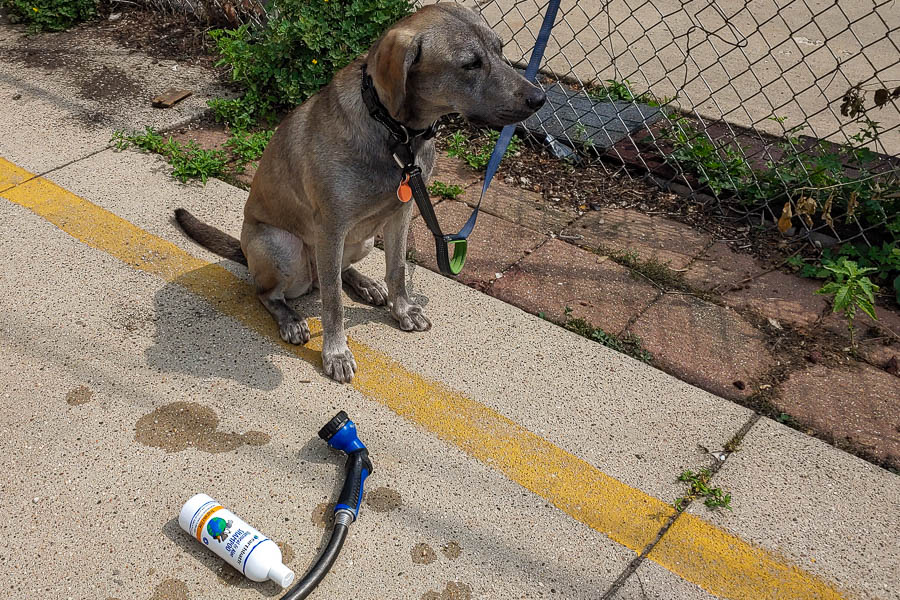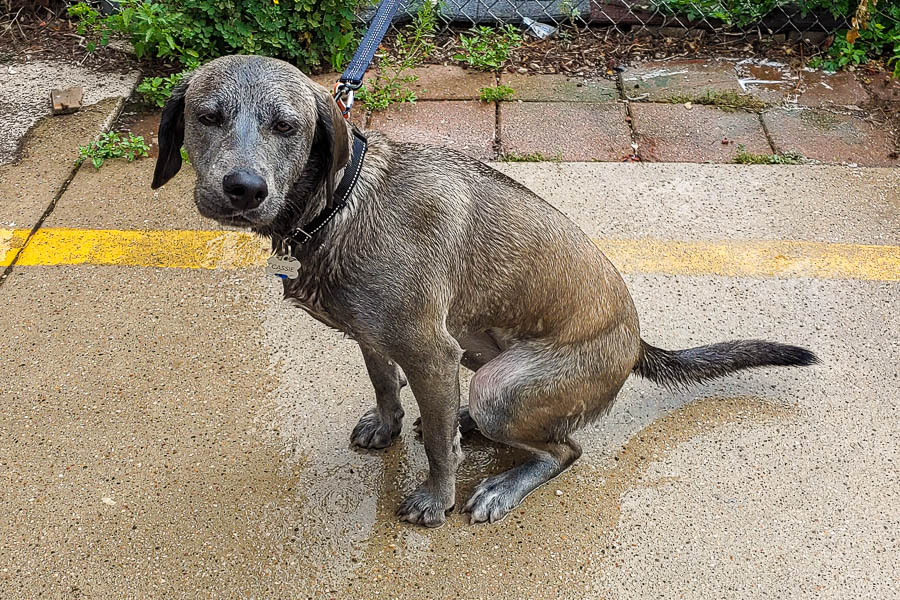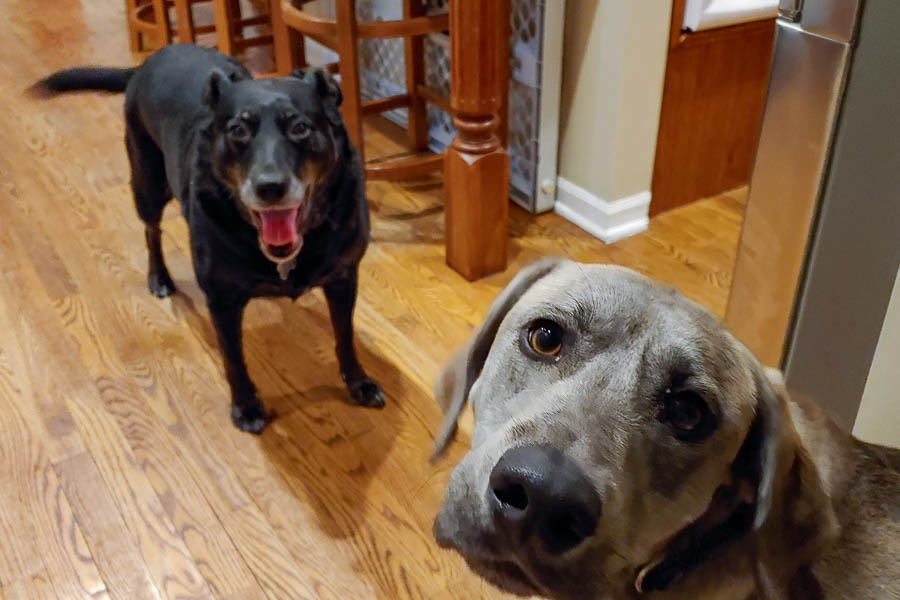Cassie last got a bath (I think) sometime in April. So, wow, did she need one today. And she was a trooper. Before:

After:

She actually likes water, so she just let me spray her down, shampoo her up, and spray her down again. Once inside and toweled off, she got the zoomies but good.
After two hours she's dry and doesn't smell like a wet dog. And she's so soft again, without the sheen of whatever she rolled in at day camp for the past few weeks.
Yesterday, Boston University clinical journalism instructor and WGBH-Boston reporter Jenifer McKim presented a story on NPR's Morning Edition about Grindr, the gay dating app. NPR's Steve Inskeep introduced the story by saying "the dating app Grindr is a popular site for men seeking other men. It's also used by underage boys, which can put them at risk of sexual exploitation and trafficking."
Between that introduction and the body of the story, I got pretty steamed. This morning I sent the following comment to NPR:
I have serious problems with the way Jenifer McKim presented this story. Principally, despite the quote from Jack Turban that "gay people aren't more likely to be sexual predators than straight people," the story heavily implies the opposite. McKim's bookending the story with quotes from assault victim German Chavez sets it up as a story about abused children, strongly implying that gay dating app Grindr is to blame (and also implying that gay men are to blame). Yet Chavez admitted that he lied about his age to circumvent Grindr's age policy, and Kathryn Macpagal even says "there aren't a lot of spaces for LGBT teens online to make friends." It seems that the problem is a lack of safe spaces for gay teens, not an app explicitly marketed to adults with strictly enforced age policies.
Further, in the graf immediately following that quote from Macpagal, McKim blows all the homophobic dog whistles, saying "over 100 men...includ[ing] police officers, priests and teachers" have "faced charges...related to sexually assaulting or attempting to meet minors for sex on Grindr." This is exactly the language that conservative groups use to vilify gays and dating apps in general.
Of course I am not downplaying the harms of sexual assault and predation on minors. But I think McKim had an obligation to put the incidence of those harms in proper context. Start with the proportion of one hundred men out of millions of Grindr users. Of the 100, how many were "police officers, priests and teachers?" How many were journalists or BU professors? How many were convicted? In how many cases was it determined that the minors in question lied about their ages? Did Grindr cooperate with the investigations? What proportion of the cases were assaults, and what proportion were "attempt[s] to meet minors?" And what proportion of Tinder users, or OKCupid users, or FarmersD users for that matter, were police, priests, or teachers (assuming McKim meant "or" and meant to include the Oxford comma) accused of crimes against children directly related to their use of the app?
I applaud McKim's ongoing efforts to protect children. But the structure, presentation, and tone of her story yesterday did not live up to the standards for accuracy and against sensationalism that I expect from NPR or WGBH-Boston.
I'll post any reply from NPR, WGBH, or McKim that I receive.
Fifty years ago today, George Harrison and Ravi Shankar put on the Concert for Bangladesh at Madison Square Garden:
It was the first major charity concert of its kind — the Concert for Bangladesh. In that corner of South Asia, civil war, cyclone and floods had created a humanitarian disaster.
"There are six million displaced Bengalis, most of them suffering from malnutrition, cholera and also other diseases that are the result of living under the most dehumanizing conditions," former All Things Considered host Mike Waters reported in July of 1971.
The situation was deeply personal for Indian musician Ravi Shankar, a sitar virtuoso, whose family came from the region. So, Shankar reached out to a close friend, former Beatle George Harrison.
He marveled at the astonishing roster Harrison was able to attract. "You have a Beatle — two Beatles in fact — that you have Ringo Starr as well. You have Bob Dylan," Thomson says. "None of these people had played live particularly much in the preceding years. So, that was an event in itself. You have a stellar backing band, people like Eric Clapton." Including, of course, Shankar on the sitar.
What they did end up making went to UNICEF. That weekend alone raised around $240,000. Millions more came later, as a result of the subsequent album and movie, all with the goal of helping refugees.
And exactly ten years later, MTV was born. (And I still have a crush on Martha Quinn.)
Yesterday, I went to a movie theater for the first time since 26 January 2020—a gap of 545 days. The movie? Black Widow. You have to watch MCU films on a big screen before watching them at home, really.
I'm also glad the last film I saw in theaters was The Gentlemen, a fun Guy Ritchie romp through London.
Other than the woman a couple rows back who kept coughing (!!!), I thoroughly enjoyed returning to a theater. After, I stopped for a crepe at the local Crêperie, where I last ate almost a year ago.
We're so close to getting back to normal. Come on, red states.
The Daily Parker has, as of yesterday, 8,000 posts since 13 May 1998. We should hit 10,000 in February 2025. Keep reading and find out!
I spent the day in Bristol, Wisconsin, eating a turkey leg and admiring the wandering bands of hordes. Regular posting returns tomorrow.
Cassie and I got completely pwned by a very small rodent last night. The critter managed to get past her and me even though we had it completely cornered at one point. I hope, however, that (a) the mouse understands the relative survivability of getting caught by a human vs. caught by a Weimaraner, and (b) the mouse understands the relative survivability of my house vs. the neighbor's dog- and cat-free house on the other side of my wall.
All of this happened, by the way, while I was brushing my teeth, so I also learned that Cassie really needs to hear complete English words or she has no idea what I'm trying to get her to do. "Cassie, to me" sounds less coherent with a toothbrush in my mouth, for example.
...that I left a medium-sized consulting firm based here in Chicago. The firm itself doesn't really matter. I left because I couldn't tolerate commuting to Houston every week to work on a project for a now-infamous energy trading firm there. No one seemed too interested in me saying the client had serious problems, and that the project, if it worked, would break all kinds of anti-trust laws. By mid-October the client proved me right when its house of cards collapsed.
I have some recollections of the summer of 2001, but of course things changed quickly, right after I started a new gig for a cool start-up on the eastern edge of Ukrainian Village. My first day was the Monday after Labor Day, the 10th.
What a strange year that was. Good thing everyone has calmed down since then.
The New York Times throws cold water on a health fad:
According to Dr. I-Min Lee, a professor of epidemiology at the Harvard T.H. Chan School of Public Health and an expert on step counts and health, the 10,000-steps target became popular in Japan in the 1960s. A clock maker, hoping to capitalize on interest in fitness after the 1964 Tokyo Olympic Games, mass-produced a pedometer with a name that, when written in Japanese characters, resembled a walking man. It also translated as “10,000-steps meter,” creating a walking aim that, through the decades, somehow became embedded in our global consciousness — and fitness trackers.
But today’s best science suggests we do not need to take 10,000 steps a day, which is about five miles, for the sake of our health or longevity.
A 2019 study by Dr. Lee and her colleagues found that women in their 70s who managed as few as 4,400 steps a day reduced their risk of premature death by about 40 percent, compared to women completing 2,700 or fewer steps a day. The risks for early death continued to drop among the women walking more than 5,000 steps a day, but benefits plateaued at about 7,500 daily steps. In other words, older women who completed fewer than half of the mythic 10,000 daily steps tended to live substantially longer than those who covered even less ground.
Another, more expansive study last year of almost 5,000 middle-aged men and women of various ethnicities likewise found that 10,000 steps a day are not a requirement for longevity. In that study, people who walked for about 8,000 steps a day were half as likely to die prematurely from heart disease or any other cause as those who accumulated 4,000 steps a day. The statistical benefits of additional steps were slight, meaning it did not hurt people to amass more daily steps, up to and beyond the 10,000-steps mark. But the extra steps did not provide much additional protection against dying young, either.
I've hit 10,000 steps 139 days in a row, but I have to keep that up through December 31st to tie my record of 312 days. In fact, in the last year, I've hit the goal 345 times, and since getting a Fitbit in October 2014, I've hit the goal 91.4% of the time. Will it kill me to stop after 9,000 steps? No. But it's an easy goal to understand and to work towards.
One of my neighbors is having his floors redone today, so I'm dogsitting. Cassie is nonplussed:

Cassie and Sophie know each other pretty well already, so no worries there. But Sophie is a quiet, middle-aged dog, and Cassie is the equivalent of a recent college grad on a bender in Lincoln Park. Sophie just wants to take a nap. Cassie just wants to play. Sophie is now on her third sleeping surface, hoping Cassie stops doing this:

I feel you, Sophe. Cassie's a lot before 9am.
At some point I'm going to have to walk both of them together. That should be...fun?